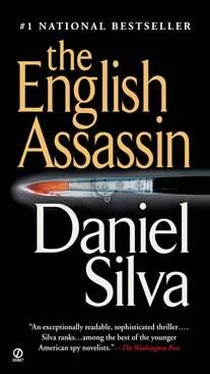Daniel Silva - The English Assassin
Здесь есть возможность читать онлайн «Daniel Silva - The English Assassin» весь текст электронной книги совершенно бесплатно (целиком полную версию без сокращений). В некоторых случаях можно слушать аудио, скачать через торрент в формате fb2 и присутствует краткое содержание. Жанр: Триллер, на английском языке. Описание произведения, (предисловие) а так же отзывы посетителей доступны на портале библиотеки ЛибКат.
- Название:The English Assassin
- Автор:
- Жанр:
- Год:неизвестен
- ISBN:нет данных
- Рейтинг книги:4 / 5. Голосов: 1
-
Избранное:Добавить в избранное
- Отзывы:
-
Ваша оценка:
The English Assassin: краткое содержание, описание и аннотация
Предлагаем к чтению аннотацию, описание, краткое содержание или предисловие (зависит от того, что написал сам автор книги «The English Assassin»). Если вы не нашли необходимую информацию о книге — напишите в комментариях, мы постараемся отыскать её.
The English Assassin brings back Gabriel Allon, the appealingly melancholy art restorer with a double life as an Israeli secret agent, first introduced in 2000's The Kill Artist. Gabriel is sent to Zurich under a pseudonym to restore a Raphael belonging to a prominent Swiss banker and art collector, Augustus Rolfe, but upon arriving he finds Rolfe lying in a pool of blood. When Gabriel tries to leave Zurich, the Swiss police capture him immediately-and moreover, they know his real identity. He's released through some diplomatic string-pulling, but he soon discovers that Rolfe had requested a meeting with Israeli intelligence, for reasons unknown, just before his death.
Rolfe's daughter, Anna, is a world-class violinist attempting to rebuild her career after an accident that nearly destroyed one of her hands. But her physical scars are nothing compared to those on her psyche, left by her mother's suicide when Anna was a teenager. Temperamental and mistrustful, she nevertheless believes Gabriel's story, and reveals that Rolfe owned a secret collection of priceless French Impressionist paintings, apparently stolen by his murderers.
As Gabriel begins to put together the pieces of the puzzle, he faces two adversaries: a powerful group of men who would do anything to bury the past forever, and a hired killer who's planning a spectacular murder. Like The Kill Artist, The English Assassin balances fascinating characters, authentic-sounding historical detail, and plenty of glamorous international intrigue on the edge of a knife-keen plot. – Barrie Trinkle
From Publishers Weekly
Switzerland 's shameful behavior in WWII provides the backdrop for this superbly crafted thriller that puts Silva at the forefront of his generation of foreign intrigue specialists. Here, the former CNN correspondent also appears to have settled on a main character to propel his promising line Gabriel Allon, the art restorer and Israeli hit man who starred in last year's acclaimed The Kill Artist. Just a few pages into this sequel, Allon finds himself the apparent victim of a double cross. When he arrives to restore a Raphael owned by reclusive Swiss banker Augustus Rolfe, Allon not only discovers the banker dead but finds himself the number one suspect. The charge doesn't stick, however, and when he is released from custody, he vows to find out who tried to frame him. His first stop is Rolfe's daughter, Anna, one of the world's top violinists and a woman haunted by her family's heritage of wartime greed and cruelty. Allon catches the attention of Switzerland 's secretive power structure, which intends to stymie any further investigation into Rolfe's murder and the theft of his suspiciously acquired art collection. The so-called Council of R�tli contracts with a shadowy hit man, known only as the Englishman, to eliminate Allon and anyone else who threatens to expose Switzerland 's past. The action unfolds in tightly focused scenes played out across a spectrum of European capitals and more pastoral settings. As a historical framework, the secrets of the Bahnhofstrasse are well-trod territory, yet Silva's sophisticated treatment polished prose, an edgy mood, convincing research gives his plot a crisp, almost urgent quality. Agent, Esther Newberg of ICM. 100,000 first printing; $100,000 national advertising campaign.












